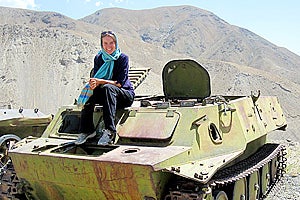Harvard Law School Student Nicolette Boehland ’13 was one of several Harvard students and instructors recently profiled in a feature story in the Harvard Gazette. The article,”How they spent summer,” by Corydon Ireland, Alvin Powell and Colleen Walsh appeared in the Sept. 1, 2011 edition of the Harvard Gazette. Read full article here. The below excerpt details Boehland’s work with the Afghanistan Independent Human Rights Commission and the group’s Special Investigation Team, exploring human rights abuses among civilian casualties and detainees in Afghanistan .
When an opportunity arose this summer to work in Afghanistan on issues of human rights, Nicolette Boehland jumped at the chance. Little did the second-year Harvard Law School student know that she would soon be crisscrossing the country in Black Hawk helicopters interviewing victims of torture.
“It was basically like being thrown into the boiling pot,” said Boehland, who got hands-on experience during her second day on the job when she was sent to a military hospital to take photos of injured civilians.
“This is something I didn’t expect at all, going in. I actually expected to be chained to my desk doing research.”
Instead, Boehland was in the field with the Afghanistan Independent Human Rights Commission and the group’s Special Investigation Team. She and her Afghan counterparts explored human rights abuses among civilian casualties and detainees. The bulk of the work involved facilities run by the National Directorate of Security, Afghanistan’s domestic intelligence agency, the Afghan equivalent of the CIA.
For two months, she and her team visited more than a dozen detention centers, interviewing officials and prisoners. For Boehland, who has worked with Human Rights Watch in the past, the encounter with victims offered her a new perspective on a field she hopes to enter after graduation.
“I’ve never worked directly with the people I was trying to help, and my human rights framework has always been very firmly intellectual. … This summer it was really interesting to see how much of it shifted right to my gut. … I can remember every single person I interviewed.”
This fall she will continue doing research with the commission and the Open Society Institute.
Boehland balanced the intensity of her workdays with an intense nightlife, taking advantage of the vibrant social scene in Kabul. Heavy security measures often led to a “stir-crazy tension” she said, one that was relieved by diversions like Hawaiian luaus, tango lessons, and dinner parties hosted by the extensive expatriot community.
She also explored the rugged beauty of Afghanistan. One hike was in Panjshir Valley, where panoramic vistas are occasionally interrupted by views of abandoned Soviet tanks, hollow reminders of the Afghan war with the Soviet Union in the 1980s.
The locals she encountered on her treks were always warm and curious to meet foreigners, she said, calling them the “most welcoming people you will ever come across.”
“They like that you are appreciating their home,” she added, “and they are happy not to see you in a tank.”
